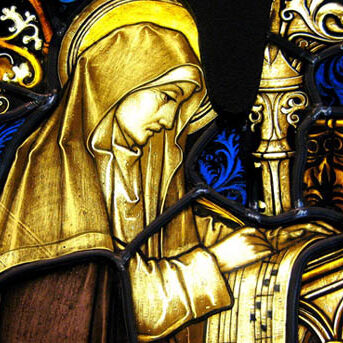
Theorist Information
Birth - ca. 1098 | Bermersheim vor der Höhe, Germany
Death - September 17, 1179 | Bingen am Rhein, Germany
Nationality - German
Era - Medieval
Theorist Biography
Hildegard von Bingen was a German abbess, composer, and visionary mystic among other titles. She was born in 1098 in Bermersheim, Germany to a noble family that followed Christian practices. As the tenth child in her family, Hildegard was promised to the Church. She was raised and educated by Jutta, a supremely devoted anchorite (a symbolic “anchor” for the world to God). Hildegard became a Benedictine nun when she was only fifteen years old, and when Jutta died in 1136, Hildegard was elected the next abbess. She has been referred to as the Sibyl of the Rhine, a sort of mythological seer, because of her visions which were believed to be a sign from God. Hildegard explained that she saw all things in the light of God through the five senses: sight, hearing, taste, smell, and touch. Throughout Hildegard’s lifetime, she suffered from poor health, including short-term paralysis and migraine headaches. Many of her visions came during the most painful illnesses.
Hildegard was hesitant to share her visions and only confided in Jutta and a few others. However, Hildegard eventually received a vision from God which she believed to be an instruction to record her visions in writing. After seeking Papal approval to document her visions, Hildegard began to write down what she saw and heard. She wrote extensively in a variety of forms including lyric poems, accounts of the lives of saints, treatises on medicine and natural history, allegorical treatises, and extensive correspondence. She traveled throughout Germany, sharing her visions and religious insights.
Hildegard composed secular music, sacred polyphony, hymns, and chants. She used music and art to express her visions; in fact, it has been said that Hildegard composed in pictures and painted with words. Some of Hildegard’s most famous work includes Scivias (Know the Ways), Liber vitae meritorum (Book of Life’s Merits), Liber divinorum operum (Book of Divine Works), Symphonia armonie celestium revelationem (The Symphony of the Harmony of Heavenly Revelations), and Ordo Virtutum. Ordo Virtutum is thought to be the first, and oldest, morality play of medieval music and presents the idea of the battle of the human soul. Hildegard’s work is even more notable because she was one of the few known composers of her time to write both music and lyrics.
Although Hildegard composed extensively, she never thought of herself as a composer. Nonetheless, there are more surviving chants by Hildegard than by any other composer from the entire Middle Ages. When Hildegard died in 1179, a canonization process was started but never completed. Hildegard is referred to as “Saint Hildegard” by the Roman Catholic Church despite never being formally canonized.
See Also
- Bent, Ian D., and Marianne Pfau. “Hildegard of Bingen.” Grove Music Online. 2001; Accessed 8 Jun. 2021. https://www-oxfordmusiconline-com.ezproxy.elon.edu/grovemusic/view/10.1093/gmo/9781561592630.001.0001/omo-9781561592630-e-0000013016.
- Hommel, Gisela. “Hildegard Von Bingen.” European Judaism: A Journal for the New Europe 21, 1 (1987): 24-28. Accessed June 9, 2021. http://www.jstor.org/stable/41442935.
- Maiello, James Vincent. Review of Hildegard of Bingen, by Honey Meconi. Fontes Artis
- Musicae 66, no. 3 (2019): 306-308. doi:10.1353/fam.2019.0034.
- Potter, Robert. “The “Ordo Virtutum”: Ancestor of the English Moralities?” Comparative Drama 20, no. 3 (1986): 201-10. Accessed June 9, 2021. http://www.jstor.org/stable/41153244.
- Quezzaire, Pilar. “Hildegard von Bingen.” Hildegard von Bingen, August 2017, 1. http://search.ebscohost.com.ezproxy.elon.edu/login.aspx?direct=true&db=b6h&AN=223 02376&site=brc-live.
- Storey, Ann. “A Theophany of the Feminine: Hildegard of Bingen, Elisabeth of Schönau, and
- Herrad of Landsberg.” Woman’s Art Journal 19, no. 1 (1998): 16-20. Accessed June 9, doi:10.2307/1358649.
- White, John D. “The Musical World of Hildegard of Bingen.” College Music Symposium 38 (1998): 6-16. Accessed June 9, 2021. http://www.jstor.org/stable/40374317.
Posters With Hildegard von Bingen
All Poster Lines
Check Out All Our Poster Lines


